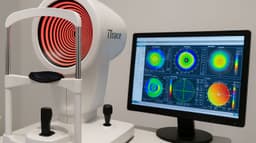
Understanding Cataracts: A Simple Explanation
What Is a Cataract & What Are The Causes?
Millions of individuals throughout the world struggle with cataracts, which is a prevalent eye condition. Although most people have heard of cataracts, few are entirely aware of what they are or how they might affect their eyesight. We hope to clarify cataracts in this article by providing information on this eye condition and its implications.
In our guide, we will be discussing what is a cataract, what causes cataracts, what they look like as well as cataract eye treatments.
What Are Cataracts?
Consider the eye as a camera that has a lens that serves to direct light onto the retina, which is the photographic film at the back of your eye. The lens is often clear and translucent, allowing light to readily travel through. However, the lens can become clouded with age or as a result of specific conditions, which causes a condition known as cataracts.
What Do Cataracts Look Like?
Picture a cataract as a small cloud or fog that develops inside your eye's lens. This haziness eventually thickens, blocking the path of light and limiting your eyesight. It is comparable to seeing through a cloudy or dirty window that distorts what you see. With cataracts, you may also experience halos around lights, multiple vision as well as poor night vision.

What Causes Cataracts?
When it comes to the causes of cataracts, they can develop for a variety of causes, such as: :
- Prolonged usage of specific medications (such as steroids)
- Specific medical conditions including diabetes
- Smoking and heavy alcohol consumption
- Eye injury or trauma
- Long-term prolonged contact with sunlight with no sufficient protection for the eyes.
What is the main cause of cataracts?
When it comes to the causes of cataracts, the most common and prevalent cause is the normal ageing process. As we age, proteins found in our eyes' lenses can break down and cluster together, resulting in cloudiness attributed to cataracts.
It is important that as you age, you begin seeking to look after your eye health and seek advice from an experienced ophthalmologist. We can provide you with a diagnosis if you feel you may be experiencing symptoms associated with cataracts.
Overall, when looking at the question ‘What is the main cause of cataracts?’ just realise that as you age, the likelier you will need to have your eye health examined.
Symptoms Of Cataracts
Cataract symptoms typically develop slowly over time, and the symptoms may not be immediately noticeable. At My-iClinic, we provide checkups and diagnoses for patients who want to stay up to date with their eye health in relation to cataracts. As the condition progresses, you may experience:
- Blurred or cloudy vision: Objects might appear less clear, which can make reading or driving difficult. If you begin to experience cataract symptoms such as this, be sure to discuss it with an ophthalmologist specialist.
- Changes in colour perception: Colors may appear faded or yellowish, or you may even experience difficulty differentiating between colours.
- Sensitivity to glare and bright lights: You might find that lights become too bright and that it’s painful or difficult to see when outdoors on a sunny day.
- Light sensitivity: Bright lights, such as sunshine or headlights in particular can generate glare or halo-like effects around things.
- Having trouble seeing during the night: the decreasing ability to see at night is another potential cataract symptom. You may be especially impacted, resulting in it being difficult to manoeuvre in low-light situations.
- Faded or dull colours: Another cataract symptom is where colours may look less vivid or yellowish, influencing your view of your surroundings.
- Double vision: You may experience confusion and discomfort when you see double pictures or ghost-like figures.
If you start to experience a combination of these cataract symptoms, see your eye doctor as soon as possible to have your eyes examined. Early diagnosis and treatment can help you manage the condition and protect your vision for years to come.
It's important to remember that cataracts are a normal part of ageing, so if you're over 50, don't be alarmed if you start to experience some of these symptoms.
Are Cataracts Hereditary?
The development of cataracts earlier in life does happen. These are known as early-onset cataracts and can even run in the family. If a close relative had cataracts earlier in life, there's a chance other family members will inherit cataracts as well.
It's important to understand that not all cataracts are inherited. It's also possible for people without a family history of cataracts to develop the condition. If you're concerned about your risk of developing cataracts, you can talk with our specialists. They can provide further information and advice on how to best protect your vision.
Treatment For Cataracts:
The positive news is that cataracts can be successfully treated with cataract surgery, which helps restore your eyesight and standard of life. However, surgery is the only permanent cure for cataracts. There are advantages that come with having cataract surgery, which we discuss in our blog on the advantages and disadvantages of cataract surgery.
The clouded lens is taken out during the procedure for cataracts and substituted with an artificial intraocular lens (IOL). This IOL replaces your natural lens permanently, enabling light to flow through clearly. The duration of a cataract surgery will depend on a range of factors, as we mentioned in our previous guide how long is a cataract surgery.

What are the most common problems after cataract surgery?
When you have treatment for cataracts, there can be some problems that can arise. However, it’s important to note that cataract surgery has a high success rate. With that being said some of the most common problems after cataract surgery include:
- Blurred vision due to swelling of the retina.
- Infection in the eye after cataract surgery.
- Posterior capsule opacification (also known as "secondary cataracts").
- Retinal detachment or tear, which can occur if left untreated. Astigmatism that wasn't present before the procedure.
- Pain – this is usually mild and can often be treated with a painkiller such as paracetamol.
It is important to highlight that removing cataracts is considerably better for vision and eye health than leaving your cataracts untreated. Although there are risks with cataract surgery, leaving a cataract to develop over time can result in blindness.
Ways Of Preventing Cataracts
Although cataracts may not be completely preventable, there are ways to lower the likelihood or prolong their onset. A majority of these measures to prevent or reduce the occurrence of cataracts include lifestyle changes such as the following :
- using UV-protective eyewear whenever you are outside in the sun
- eating a balanced, fruit- and vegetable-rich diet
- Putting a stop to smoking and limiting alcohol use
- managing underlying health issues including diabetes.
Understanding Cataracts For Better Eye Health
Cataracts are a common eye condition characterised by a clouding of the lens, leading to blurred vision and other visual disturbances. While they primarily develop due to ageing, other factors can contribute to their formation.
Recognising the symptoms of cataracts and seeking timely treatment through surgery can help restore clear vision. By gaining a better understanding of cataracts, you’re able to take the best course of action when it comes to treating the condition, whether you’re experiencing early-onset symptoms or are looking to receive immediate surgery to improve your vision.
Finding The Right Eye Clinic In London
If you have been experiencing symptoms associated with cataracts, or you would like an eye diagnosis, please get in touch for consultation regarding cataract surgery with our experienced ophthalmologists.
Regain your clarity of vision today! Schedule your appointment at our London vision correction clinic. Don't let cataracts dim your world - book your consultation now and step into a brighter, clearer future.
Find out more by Speaking to our team









